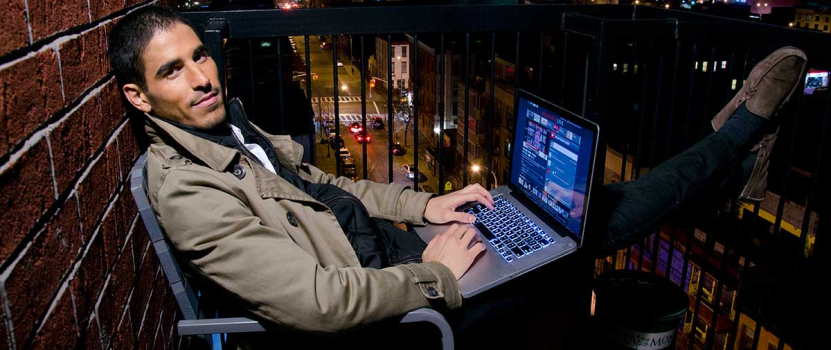
In a region where repression, self-censorship and a rigid status quo are the norm, perhaps one of the best positioned voices to speak about the intersection of digital media, democracy and social change is that of Ahmed Shihab-Eldin.
With his impressive CV, Emmy-nominated journalist, social media addict and news producer Shihab-Eldin has borne witness to both unashamed government control as well as revolutionary disruptive movements by citizens in Lebanon, Qatar, UAE, Egypt, Jordan and other locations in the West and the Arab world.
Here, he speaks to us about the state of media in the Middle East, from the unrelenting crackdown on journalists to the inspiring democratization of social media.
Much of your work has been on content about the region for a Western audience, what issues would you tackle for a regional audience?
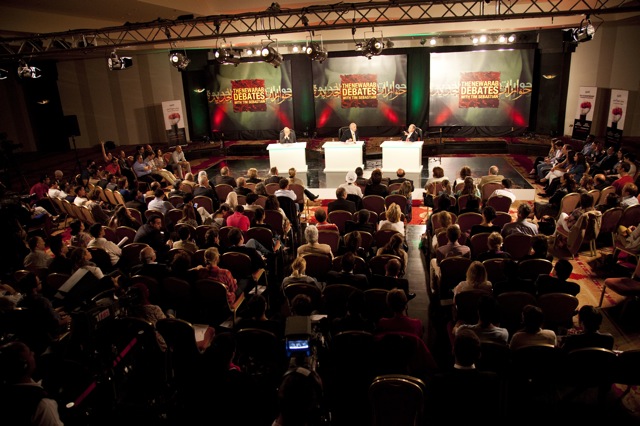
For a Western audience, the main aim is to provide context and deconstruct age-old stereotypes that perpetuate misperceptions of the region.
But in the Arab world, there is far too much emphasis on our divisions rather than our shared values, culture and aspirations.
For the West, context is needed to prevent individual news stories from being exploited, whether intentionally or unintentionally.
I focus on challenging stereotypes and perceptions. For example, that Arabs and Muslims are inherently angry, uncivilized and violent.
But for a regional audience, I hope to challenge the assumption and convenient belief that most, if not, all of our problems are the product of decades of Western colonialism. As a Palestinian whose parents fled in 1948 and 1967, I understand the ramifications of Western powers irresponsibly drawing lines in the sand and in doing so arguably sowing the seeds of conflict.
But it is critical to also be self-critical and hold our own society and it’s leaders to account.
Too often the media and public discourse in the region criticizes the West for its lack of accountability while meddling in the region – whether for natural resources or other geo-political ambitions.
We must be as willing, if not more willing, to turn the mirror unto ourselves and delve into the rampant corruption, nepotism, and obstacles for reform in both the public and private sectors that plague our own societies and have led to an epidemic of youth unemployment and unbridled poverty, and worst of all a deep sense that our governments do not represent our interests.
This only further enables groups to exploit religion and in some cases God as our ultimate and only hope and salvation for a better life. I would be sure to focus more on some of that.
How do you see the media system in the region developing (or not?) over the next period?
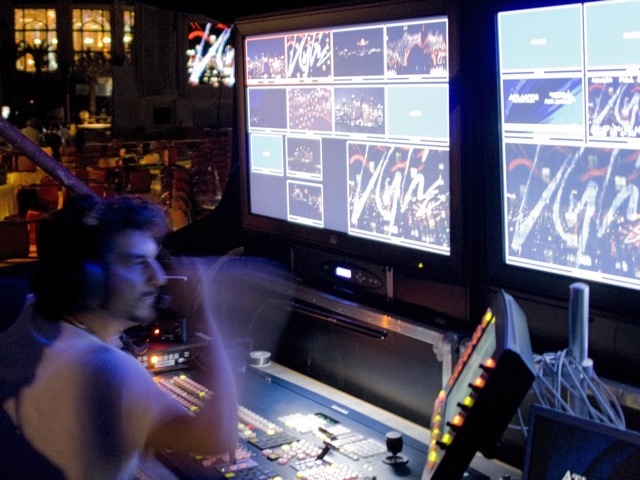
In just a few short years we’ve seen a dramatic shift. First a democratization, followed by a subsequent regression. As they say, two steps forward and one step back.
What is most encouraging is the chain reaction surrounding the proliferation and popularization of social media and digital media in the region. It has not only revolutionized the media system but is profoundly enabling shifts with civic engagement and political participation and entrepreneurship.
The amplification of civic discourse has permeated far beyond the media realm and has given hope for the potential development and democratization of society.
It is understandable that the concept, let alone the very word “democracy” stirs the ire of the region’s established leaders. Democratization and any decentralization of power challenges their authoritarian power and ability to govern with little accountability.
But as more and more people are able to broadcast their grievances, opinions and ideas, with the potential to connect with like-minded individuals and those with ideas that challenge their own, both the media and society generally is poised for development.
The biggest challenge to the evolution of the region’s media system, is the widespread and severe crackdown on free speech.
Censorship, particularly self-censorship, is on the rise. Journalists and reporters are increasingly being harassed, intimidated and arrested under broad and unchecked “counter-terrorism” legislation that doesn’t distinguish between constructive dissent and destructive terror
In 1991, Al Jazeera – the first pan-Arab 24 hour news channel that dared to consistently and boldly allow and encourage all opinions, including those that openly questioned taboos or the legitimacy and actions of Arab regimes – launched.
I moved to Egypt in 1991. The next year, the Internet arrived. The combination of more pan-Arab satellite channels as well as the Internet’s arrival sparked the media revolution in the region.
Among the many discouraging and dangerous crackdowns on free speech, the now infamous Al Jazeera case, in which three journalists were jailed for between 7-10 years for “national security” concerns on baseless grounds is an indicator of the challenges that lay ahead.
Egypt’s President Sisi refused to intervene despite please from President Obama and other world leaders. Sisi, who justified his ousting of former President Morsi as an attempt to preserve “democracy” has arguably made matters much worse.
What are your thoughts on the state of digital media in the region?

The Islamic State can offer insight as to the state of digital media in the region. The group’s so-called “sophisticated” use of social media has once again focused the world’s attention on the Arab world and power of the medium as it has proven invaluable and dangerous.
Through it, ISIS has propagated its propaganda earning itself notoriety as well as a surprisingly steady flow of global recruits.
Of course, it’s not just terrorist groups that have been empowered by the growth of digital media.
There are more than 135 million internet users in 22 Arab countries; more than 300 million mobile devices, which amounts to more than 35 percent of the population communicating, engaging and publishing online.
Unsurprisingly, Saudi Arabia, one of the region’s diplomatic heavy-hitters as well as most repressive Arab state, has the highest percentage of citizens on Twitter. They also have the biggest YouTube audience with 90 million views a day.
The trend of repression prompting interest, prompting more repression is a tenuous one. Just as the region’s youth led the digital revolution that helped accelerate the revolts on the ground in recent years, they are also leading the democratization and decentralization of information whether knowingly or not.
Tens of millions of Arab citizens are creating and sharing content in a public forum online helps set the news agenda. Certain issues can no longer be ignored – at least not in their entirety.
It is undeniable that the Arab world is experiencing more freedom of expression. But it is just as true that Arab governments as well as religious groups are also more focused on targeting and cracking down on individuals.
It is encouraging to see conventional media as well as the nascent pan-Arab satellite news networks adopt a much more multi-platform approach to reaching community or audience.
We’ve also seen news organizations use the social media phenomenon to their advantage to leak stories on social media aiming to preempt any formal crackdowns or censorship. This process of testing content amongst the most engaged citizens is an indication of where the most innovation will originate in the coming years.
But censorship aside, there remains a glaring lack of standards and ethics across the board.
Much like Cairo’s slow and sluggish traffic, during the uprising in Egypt, the government increasingly used social media to engage constituents. We’ve seen this trend across the region. The public investment in technology infrastructure as well as competitive environments for network providers have helped to bridge the digital gap that once existed with much of the rest of the world.
The focus on mobile phone networks and broadband access is encouraging. At least two gulf countries are among the top 10 economies with the greatest change in access. People are also spending a lot of time online. The average user spends upwards of nine hours a day engaging with media whether on the internet on TV or through mobile communication.
There is a thirst for news and information, especially as cynicism about government has only increased since the uprisings.
The search for crowd-sourced news regardless of the platform or consumption method is pressuring government to engage in these areas of influence.
In Bahrain, and in Egypt, government officials and bodies frequently use Facebook and Twitter to quash rumours, make announcements, and issue decrees.
The Internet arrived in Egypt in 1992. That was one year after I arrived. I’ll never forget my first conversations through ICQ (an Israeli-built technology popular in Egypt at the time) that I used to connect to others in Egypt and beyond. It was perhaps a short preview of the broader conversations that would emerge, puncturing the state-controlled media climate.
Digital media has benefited by the general trend towards self-expression that the internet enables, even in the most repressive of Arab states.
There is a palpable start-up culture that is slowly taking form, which is partly a product of the psychological and somewhat aspirational recognition that perhaps there is hope for positive change, after decades of malaise and relative stagnation.
More and more people get their news online, and more people are using social media networks on a daily basis to communicate, whether public-facing or private – such as WhatsApp.
As connectivity increases, and Internet penetration continues to grow, it seems likely that digital media will continue to transform society. The speed will be dependent on the government’s willingness to allow the conversation to continue.
In the Arab world, Internet access is unfortunately limited by the high cost of connectivity as well as the weak competition in the telecom industry. Unlike the Gulf region, many Arab countries still have fewer than 25 percent of households with access to high-speed Internet, despite gains made in the last decade.
The fear factor – which was so passionately declared broken during the uprisings – has persisted, as many are once again afraid to challenge the status-quo.
What role do you think digital media should play in the socio-political development of the region?
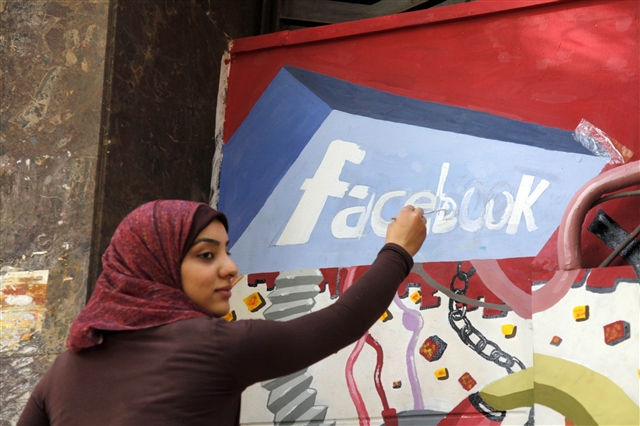
There is a symbiotic role between the democratization of media and the democratization of society or the socio-political maturity of countries in the region.
Sure, digital media can be a sounding board or an avenue to exchange ideas, disagree, argue, give your two cents, but it also has an incredible power to bring about real change – specifically accountability.
Look at Harassmap. Or Pigipedia in Egypt. Or some of newer initiatives which encourage citizens to engage with their governments or elected officials or with citizens in other countries.
This can allow for comparisons of grievances or social phenomena, and can in most primitive way allow for points of comparisons on similar challenges whether economic, or something as seemingly tedious as traffic (which obviously can have huge effect on an economy and country’s health).
How can digital media as a tool for social change reach its potential in a region where the media is so controlled?
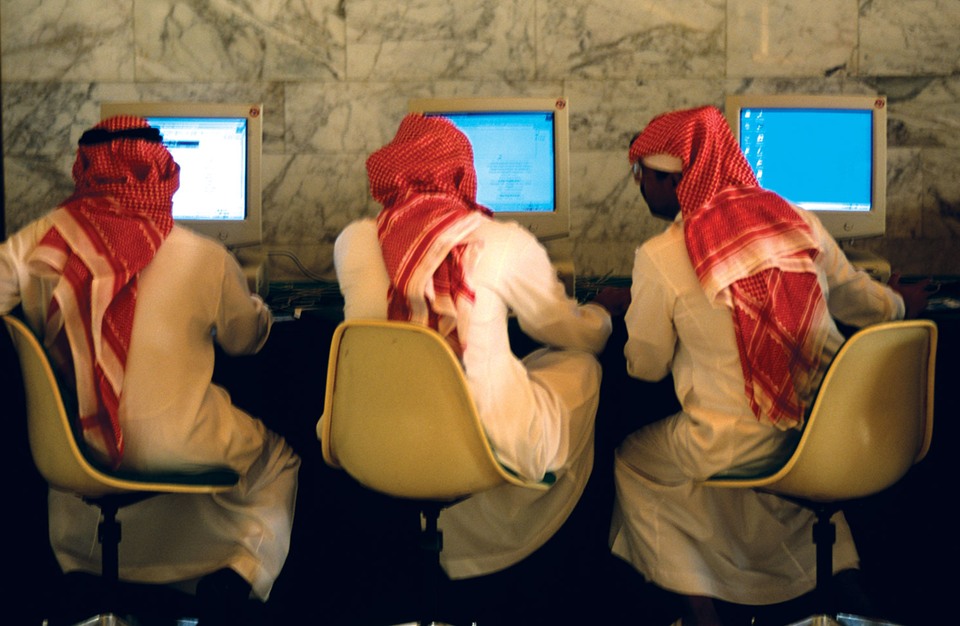
There are four times more Facebook subscribers under the age of 30 in the Arab world than there are registered university students.
Access to independent journalism is increasingly targeted in Egypt, Jordan and across the region. But governments are paying attention. One of the motivating factors for protesters during the uprising was a sense of being disconnected from their governments, a sense that their leaders did not know or represent their interests. They could not participate.
But social media and the Internet have forced participation.
The government can no longer simply ignore a group of citizen’s demands the way they used to because aside from the decentralization of information, corruption and other abuses of power have been and will continue to be documented by the brave citizens in the region: whether it’s women’s rights, the mistreatment of migrant workers, homosexuality, or shortages of food, water and other basic goods.
The citizen is stepping in where the state is failing.
In Egypt, with Harassmap, a response to the persistent problem of sexual harassment on the streets of Egypt empowering people to anonymous reporting and mapping system for harassment.
In Syria, online platforms are alerting residents of incoming scud missiles. By nature, authoritarian governments are going to continue to be committed to invest resources in technology to control the Internet’s power to empower the citizen or the individual, which is why supporting organizations such as The Electronic Frontier Foundation is so important.
In Egypt, online communications are now being monitored by the sister company of a cybersecurity firm based in the States, affording Egypt’s government even more access to its citizens data on Skype, Facebook, Twitter, YouTube and other social platforms. See Egypt, the sister company of the U.S.-based Blue Coat, marks the first time Egypt uses Deep Packet Inspection technology.
Governments should instead look to leverage the power of social media and the digital platforms to better interact with citizens across the region.
Dubai’s Mohammed bin Rashid School of Government released its 2014 Social Media Report and found that unfortunately social media is still largely used as a one-way information source for the majority of those who actually use it to interact with their government.
Only 2% of respondents used personal social media accounts to source information about services offered by the government. Of the 63% who use government social media pages, 74% only use it to access information; still opportunities exist for feedback, sending complaints or new ideas to engage with their governments.
What are your thoughts on the treatment of journalists in Egypt and the rest of the region?
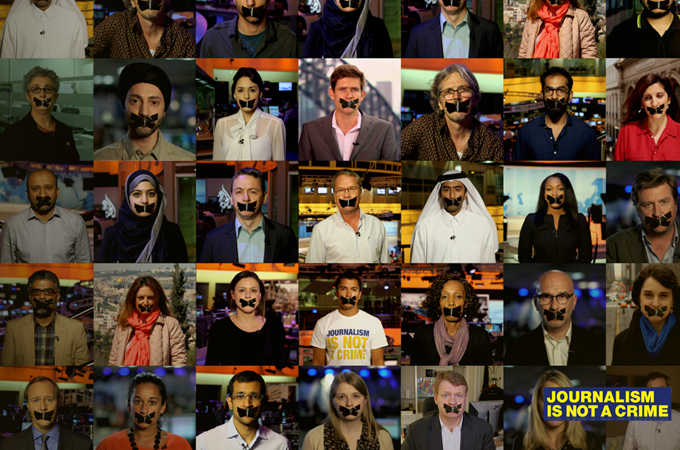
In Egypt almost all of the media in the country – whether state-owned or private – has largely overwhelmingly supported the government’s anti-terrorist strategy and the demonization of the Muslim Brotherhood.
As a result, anyone who appears to challenge the government on this consuming policy – whether Islamist or not – is framed to be culpable of terrorism. Civic engagement and dissent in today’s Egypt is tantamount to terrorism.
Aside from the obvious negative ramifications, the fact that today in Egypt most journalists actively and publicly support the government, undermines the spirit of the revolution as well as the value of the reporting being produced.
Al Jazeera, which did in fact support the Muslim Brotherhood, finds itself the biggest victim of the blanket equating of critical journalism with terrorism.
The demonization of Al Jazeera alongside the Brotherhood and the jailing of its journalists – Peter Greste, Mohamed Fahmy and Baher Mohammed – has also unfortunately led to a lack of public anger at the continuing prosecution of journalists. For as much as it was once said the fear factor has been broken, it seems the muzzles have returned.
In Egypt, like too much of the region, criticizing the government and voicing differences of opinion are not tolerated. This is true even on the Internet, which of course is more difficult to monitor despite most countries’ investing resources to do just that.
Tens of thousands have been arrested, and hundreds simply disappeared for speaking out under Sisi’s short tenure as president.
Regrettably, for those of us who lived in Egypt under Mubarak, it is difficult to believe the extent to which the human rights situation has deteriorated.
The same self-censorship witnessed in Egypt as a product of severe intimidation and arbitrary arrests as well as deaths has permeated beyond Egypt’s media circles and sadly the same story is true across the board.
WE SAID THIS: Stay tuned for the rest of Shihab-Eldin’s interview tomorrow and check out our Q&A with the guys behind the Internet Revolution in Egypt.



